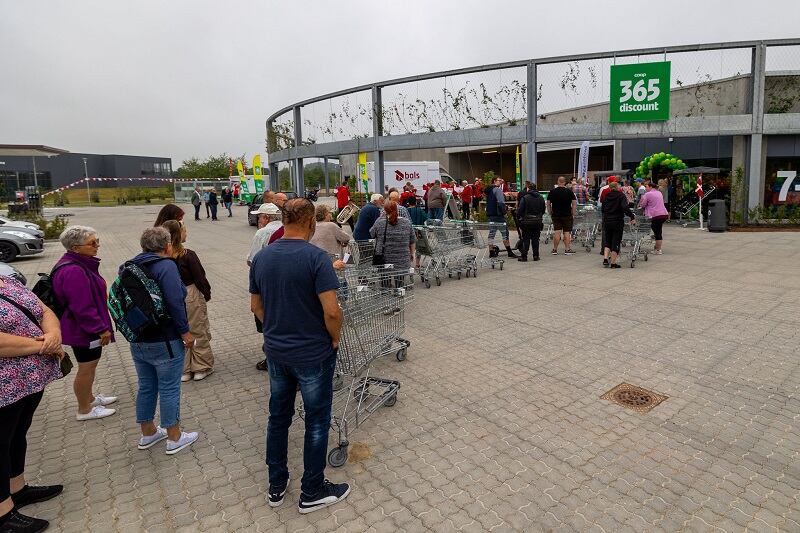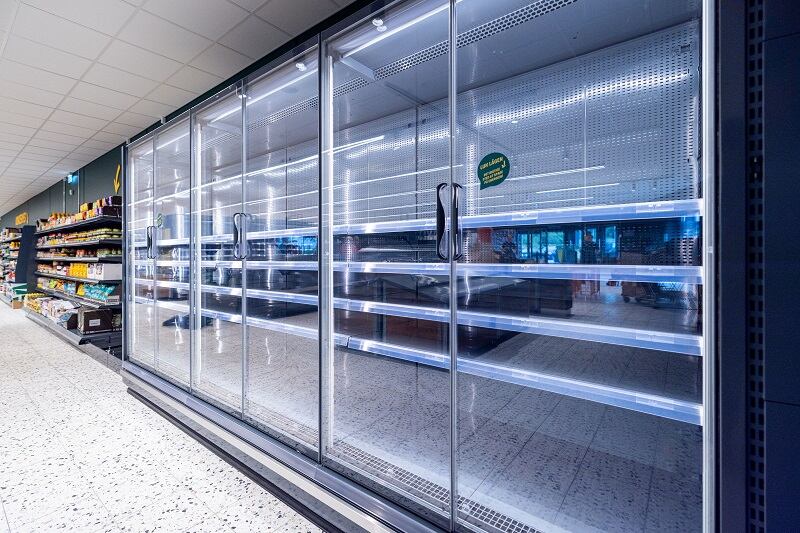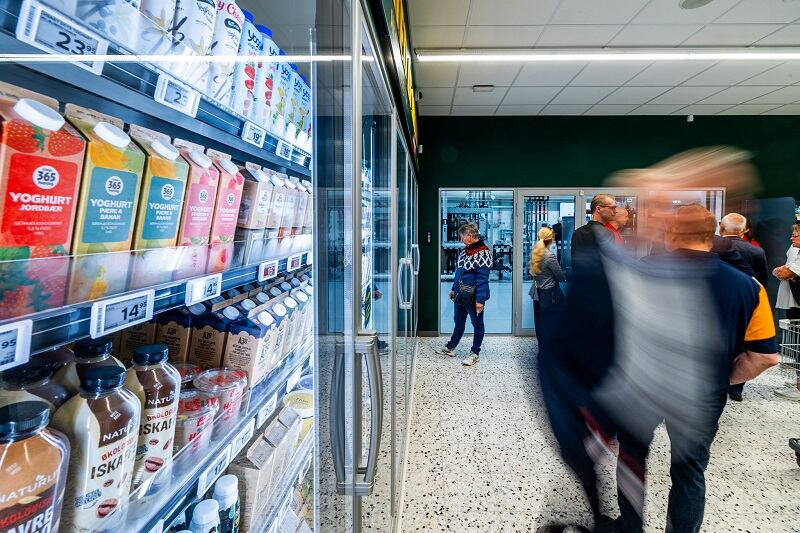The 1,500 sqm flagship store – leased to the discount retailer COOP 365 and built next to the Danfoss headquarters in Nordborg – runs off sustainable energy sources and reuses the excess heat created by cooling cases to cut heating costs by up to 90%.
Danfoss claimed the flagship store, which opened to the public on June 29, is expected to be around 50% more energy efficient compared to a typical supermarket with a first-generation CO2 refrigeration system and no energy efficiency solutions. It is also expected to be approximately 20-30% more efficient than an equivalent local store already fitted with multiple energy efficiency solutions.
Using advanced heating and cooling technology makes good business sense too, the company claimed. These savings come with a typical payback time of under three years, it said.
The store operates both as a functioning supermarket and a development centre for testing new technology. Danfoss hopes it will ‘inspire food retailers in a world of rising energy costs, emissions, and worsening food losses’.
“This supermarket is purpose-built for the world ahead of us; a world of more urbanization, larger populations, greater energy demands, a growing need for cooling, and efficient food storage,” said Jürgen Fischer, President, Danfoss Climate Solutions.
“Danfoss has reimagined what food retail stores could look like in the 21st century,” he said. “For the first time, all of Danfoss’ most cutting-edge technology and energy efficient food retail solutions are being brought together into one retail site. But the new Smart Store supermarket is only the beginning. Because it will also serve as an Application Development Center, a ‘live’ testing site for new technologies which we hope will inspire food retailers around the world to move towards zero emissions supermarkets – while making economic sense.”

The efficiency solutions employed to reduce the overall energy needs of the store
Supermarkets are big energy consumers. Supermarkets in industrialised countries consume around 3% of a nation’s electricity production.
Energy is therefore an area where significant savings can be achieved by food retailers with relatively low investment and good payback times, according to Danfoss.
The supermarket will utilize solar power as its primary energy source, with 100 kW solar panels on the building’s roof providing green energy to support the supermarket operations.
Heat capture and reuse is also key to the energy efficiency of the supermarket. Excess heat is the world’s largest untapped source of energy. The store is therefore fitted with state-of-the-art heat recovery units, designed to recover the waste heat from all the refrigeration systems: refrigeration systems represent by far the highest share of the total energy consumed in supermarkets.
The recovered heat is reused to heat up the store and produce domestic hot water, with any additional heat shared with residents of the surrounding town through a district energy network. Danfoss expects up to a 90% reduction in supermarket heating costs as a result. “In Germany, there are about 30,000 supermarkets which have low temp cooling of minus 18 to minus 24 degrees Celsius,” Fischer revealed. “If you use that as energy storage that corresponds to 10 nuclear power plants.”
Plugging the leaks
Other initiatives, such as installing doors on refrigerator and freezer cases, will save around a third on energy use, while the choice of LED lighting uses up to 85% less electricity than incandescent bulbs. Automation and monitoring of the ‘Smart Store’ adds another layer of energy saving.
Danfoss claimed there is 3% energy leak rate in Europe, which is significantly more in the developing world. Smart refrigeration case control, it said, saves, 8-12% of energy use at system level.
To optimize refrigeration efficiency, it’s important to match capacity to demand, Danfoss stressed. Too much cooling, and you waste energy and risk system damage; too little, and you risk food loss.
Adapting energy consumption can further allow supermarkets to benefit from cheaper tariffs. The supermarket’s refrigeration system, Danfoss explained, is utilized like a thermal battery, effectively storing or borrowing cooling capacity in the store freezers while energy is cheap or solar electricity is plentiful, then temporarily switching off the compressors during high-cost peak times until the peak has passed.
Industry is increasingly seeking ways to save energy via temperature controls
The issue of refrigeration systems, energy and the environment is timely. Unilever, for example, is looking to ‘warm up’ ice cream freezers to help tackle emissions. The downside to this plan is that products will have to withstand the higher storage temperatures.
Danfoss said 'Smart Store' products won’t need to be reformulated. “There is no reason why you should not have several temperatures in the supermarket organised in a good way with good technology and digital systems in place,” Fischer said.
Reducing food loss
The company does though believe that timely responses to issues in cooling units are critical to preventing food losses. The resources needed to produce the food that becomes lost or wasted have a carbon footprint of about 3.3 billion tonnes of CO2, it claimed.
The company is therefore employing solutions at various stages of the value chain to address the problem. In India, for example, solar powered refrigeration units installed in fields can ensure produce lasts up to three days longer and doesn’t spoil by the time it reaches market.

Its solutions also promise to control temperature during transportation to food retailers. Once in the ‘Smart Store’, meanwhile, it has installed digital, real-time monitoring technology on refrigeration systems and individual products which will alert store managers to problems before they occur.
For example, if a supermarket freezer case was to fail overnight then it’s probable that the entire line of frozen foods stocked in that freezer would need to be disposed of as food loss. “Preventing food loss at such scale is critical to preventing lost revenue and reducing emissions,” Danfoss said. “Immediately when there is something wrong on the temperature side an alarm will out and we can fix it remotely,” elaborated Fischer.
Service business model
But this kind of technology can be challenging and costly for food retailers to retrofit. Danfoss therefore plans to scale its energy-saving supermarket vison via a service model. “Basically, we run the whole building including the energy system,” explained Fischer. “The supermarket can focus fully on selling food. We promise to reduce the energy to a level which is lower than other supermarkets and we promise a Co2 reduction per year as a percentage.” Danfoss is first targeting partners in the Nordics and Germany, to be followed by a full European and global push. “Supermarkets will pay a fixed fee just like if you were renting an apartment including heating. In this case, it includes lighting, heating, and we also own and take care of the equipment.”
Danfoss also takes care of 24/7 technical support, mostly remotely, but crucial amid a shortage of qualified heating engineers and a significant green energy skills gap across Europe.
Danfoss said the fixed fee for supermarkets will 'not be more or less' than the rents supermarkets pay already. But the building the 'Smart Store' cost over £10 billion (EUR 11.6 billion), around three times the cost of standard stores with no green technology.
“The global financial world is very interested in green technology and there is much more money than opportunity,” added Fischer. “That’s why the service model will be a super accelerator.”


